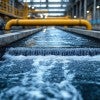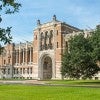
Folding the future: Origami helping Rice engineer Novelino transform materials, structures
Larissa Novelino has built her research on a surprising foundation: the centuries-old Japanese art of paper folding.

Folding the future: Origami helping Rice engineer Novelino transform materials, structures
Larissa Novelino has built her research on a surprising foundation: the centuries-old Japanese art of paper folding.

AI can help communities prepare for, respond to climate risks during peak hurricane season
As the Gulf Coast heads into the most active stretch of the Atlantic hurricane season — August through September — forecasters warn the region could face heightened storm activity this year, fueled by warm ocean waters and a changing climate.

The course co-taught by Juan José Castellón and Kalil Erazo paired architecture and engineering students to study how sustainable structures are conceived and built.

A smarter membrane for cleaner water
A team of researchers led by Menachem Elimelech and his former postdoctoral researcher Yanghua Duan at Rice has taken a major step toward solving one of water purification’s biggest puzzles: how to best design catalytic membranes that simultaneously filter and transform contaminants in a single step.

Rice SSPEED Center’s FIRST system provides critical flood warnings in real time
In the aftermath of the devastating July 2025 floods in the Texas Hill Country, the need for reliable, real-time flood warning systems has never been more urgent.

Rice engineering student honored for research to reduce surgical complications
Chihtong “Lily” Lee recently earned second place in the undergraduate category at the ASME SB3C Summer Bioengineering Conference, a competition hosted by the American Society of Mechanical Engineers.

Rice-led forum tackles critical water-energy nexus in Washington, D.C.
In a time of escalating climate risks, crumbling infrastructure and ballooning industrial demand, understanding how water and energy intertwine has never been more urgent. That was the resounding message from experts who convened May 19 in Washington, D.C., for “The Intersection of Water and Energy, 2025-2030,” a forum hosted by Rice and Arizona State University.

The Severe Storm Prediction, Education and Evacuation from Disasters Center at Rice, in collaboration with a team of experts, has developed the Galveston Bay Park Plan, an in-bay barrier and park system designed to provide enhanced storm surge protection and navigation and environmental benefits for the highly vulnerable west side of Galveston Bay.

Forecasters predicting 17 named storms in Atlantic this hurricane season
Experts from Rice are available to speak with the media about hurricane and storm-related topics.

Machine learning powers new approach to detecting soil contaminants
A team of researchers at Rice and Baylor College of Medicine has developed a new strategy for identifying hazardous pollutants in soil ⎯ even ones that have never been isolated or studied in a lab.

‘Deeply meaningful’: Rice President Reginald DesRoches named ASCE distinguished member
Rice President Reginald DesRoches, a nationally recognized leader in resilient infrastructure and engineering education, has been elected to the 2025 class of distinguished members of the American Society of Civil Engineers (ASCE).

New roadmap advances catalytic solutions to destroy ‘forever chemicals’
A team of researchers from Rice, Carnegie Mellon University and other leading global institutions has outlined a bold new roadmap for harnessing heterogeneous catalysis to destroy per- and polyfluoroalkyl substances (PFAS), the so-called “forever chemicals” that have contaminated water supplies worldwide.

Rice experts can address severe weather and flooding risks caused by current omega block
Rice experts can address severe weather and flooding risks caused by current omega block.

Menachem Elimelech was honored with the Sidney Loeb Award at the European Desalination Society Conference held in Porto, Portugal, April 28.

Rice graduate programs excel in US News rankings
Rice continues to stand out for its academic excellence with several graduate programs earning high marks in the latest edition of U.S. News & World Report’s “Best Graduate Schools” rankings.